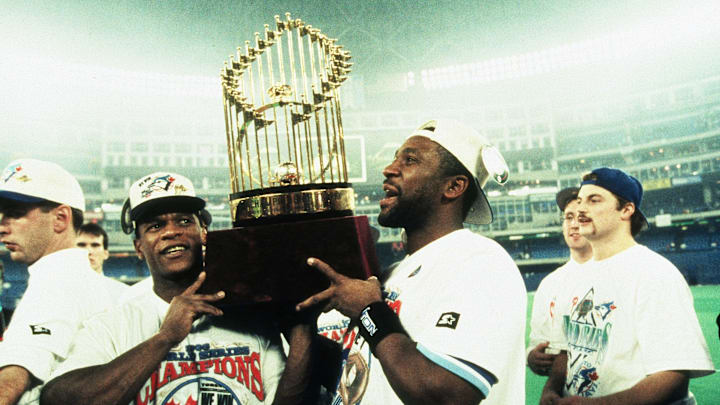2. David Freese, 2011 St. Louis Cardinals. The previously described heroics of Hamilton and Berkman would have counted for nothing had Freese not already intervened. When the veteran third baseman came to the plate in the bottom of the ninth inning, Texas led 7-5, Neftali Feliz had retired two Cardinal batters, Pujols and Berkman occupied second and first bases as the tying runs, and Freese represented the last Cardinal hope.
Only an extra base hit would keep the Cardinal hopes alive. With a1-2 count, Feliz fired a fastball toward the outside corner. Freese reached out and caught it solidly, sending the ball on a line toward the right field wall.
Ranger right fielder Nelson Cruz thought he had a play, but the ball evaded his grasp, clanged off the wall and ricocheted back toward the infield, forcing Cruz to chase after it. By the time he caught up, Pujols and Berkman had both scored and Freese was safely in at third base with a triple.
Two innings later, leading off the bottom of the 11th, Freese ended the game with a home run, setting up a Cardinal Game 7 victory. His 11th inning home run only valued out at 37 percent 14th on the Game 6 list. But that ninth inning triple, erasing a two-run deficit in extra innings, ranks second. Freese Win Probability Added: 54 percent.
1. Joe Carter, 1993 Toronto Blue Jays. Carter’s memorable shot into the left field seats at the stadium then known as the Skydome may not be the most memorable home run in baseball history, but it’s on the list. It ended the 1993 World Series in favor of Carter’s Jays, only the second time in Series history the championship had turned on a walkoff blast.
This was the situation. The National League champion Philadelphia Phillies, needing a victory to take the Series to a seventh game, led the defending champion Jays 6-5 entering the ninth inning. Phillies closer Mitch Williams took the mound armed with a devastating strikeout pitch but an annoying tendency to walk batters.
Indeed, Williams walked the first batter he faced, Rickey Henderson, before retiring Devon White on a fly ball. Paul Molitor followed with a base hit.
That brought up Carter, Toronto’s cleanup hitter, coming off a 33-homer, 121 RBI season. With a 2-2 count, Williams got a fastball middle-in to Carter, who pulled it just inside the left field foul pole. Henderson and Molitor scored ahead of him giving Toronto an 8-6 win and the championship in six games. Carter Win Probability Added: 66 percent.
